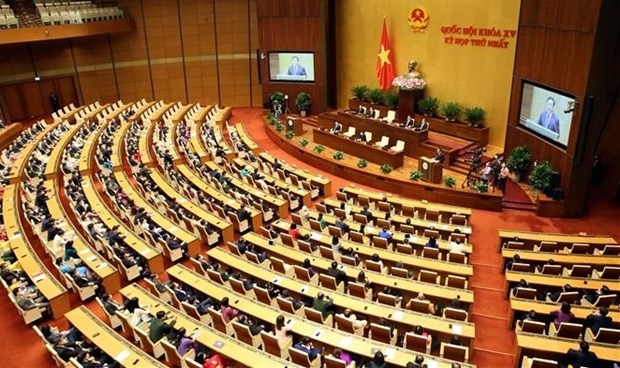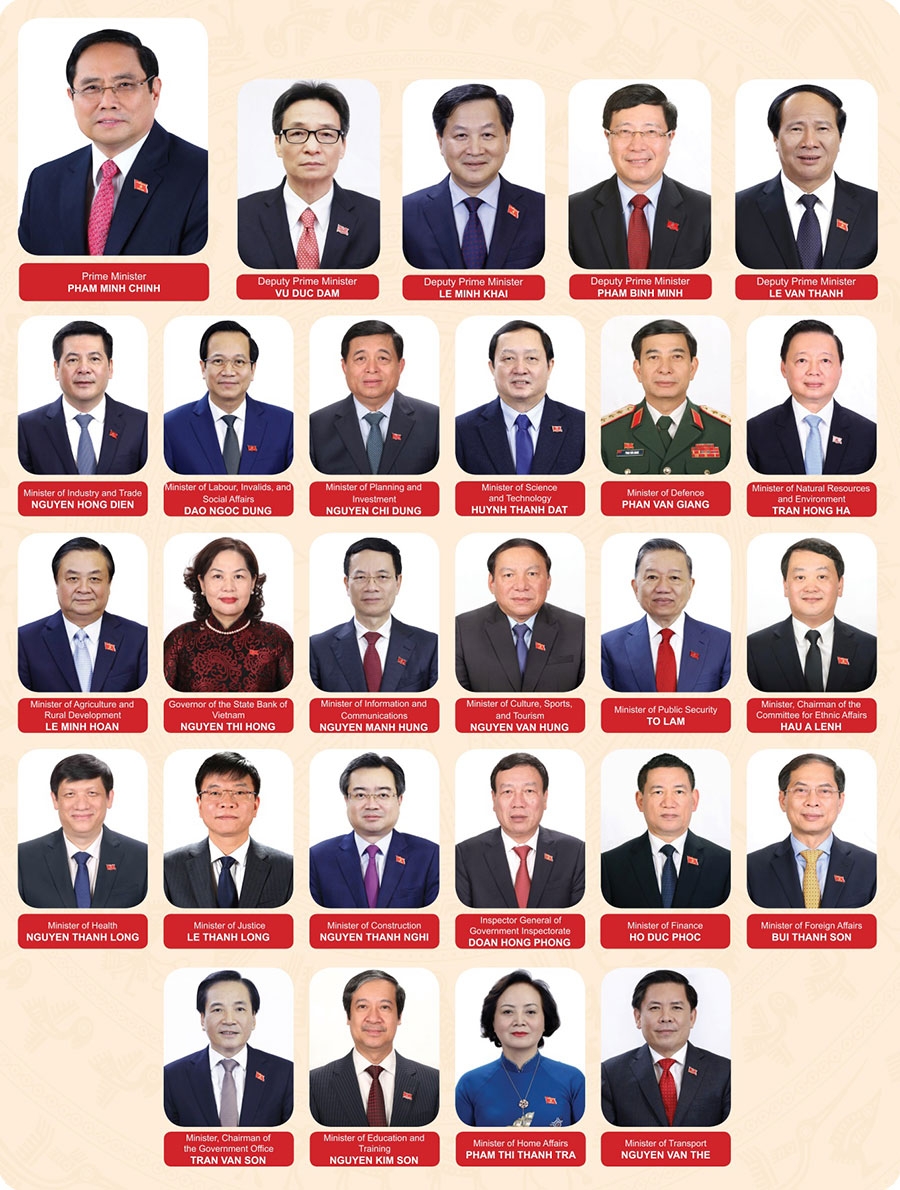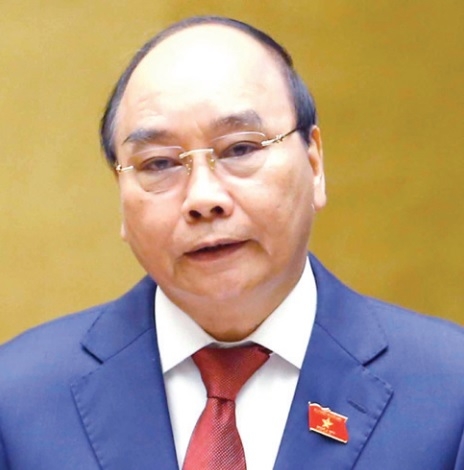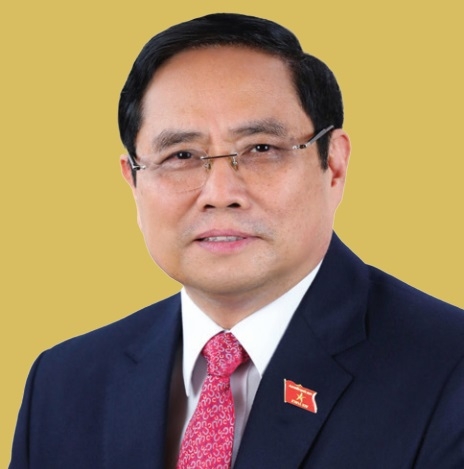Leadership vows to aim for prosperous future
 |
| At a session of the 15th National Assembly (Photo: VNA) |
The first session of the 15th National Assembly (NA) last Monday elected Vietnam’s new prime minister and new state president. It passed a resolution on re-electing Nguyen Xuan Phuc as state president, and another resolution on re-electing Pham Minh Chinh as prime minister, both for the 2021-2026 tenure. The Politburo members have held these positions since April 2021 (the 2016-2021 term).
After the ballot, the new leaders took the oath of office under the flag and before the NA and constituents nationwide, vowing to “be completely faithful to the country, people, and the Constitution of the Socialist Republic of Vietnam,” and they will do their utmost “to accomplish all tasks assigned by the Party, the state, and the people.”
Phuc, 67, received 100 per cent of all the 483 votes at the election to become the 11th president since 1945, when President Ho Chi Minh read the Declaration of Independence to establish the Democratic Republic of Vietnam. Phuc, who acted as the prime minister from 2016 to April this year, was also the first prime minister in Vietnam to be elected as state president.
In Vietnam, the state president is the country’s top representative in both internal and external affairs; and commander-in-chief of the armed forces.
Phuc was born in the central province of Quang Nam. Between 1997 and 2006 he was Chairman of the province’s People’s Committee, Deputy Inspector-General of the Government Inspectorate, and Chairman of the Government Office. He became Deputy Prime Minister in 2011 and Prime Minister in 2016.
Meanwhile, new Prime Minister Chinh, 63, got 100 per cent of all the 479 votes at the election to become the eighth prime minister of Vietnam. Born in the north-central province of Thanh Hoa, he was a member of the Party Central Committee in the 11th, 12th and 13th tenures, a Politburo member in the 12th and 13th tenures, and Secretary of the Party Central Committee in the 12th tenure. Chinh has also been Chairman of the Party Central Committee’s Organisation Commission, head of the committee’s sub-committee for internal political protection in the 12th tenure, an NA deputy in the 14th tenure, and Chairman of the Vietnam-Japan Parliamentary Friendship Group of the 14th NA.
| Nguyen Xuan Phuc State President
Since Vietnam commenced its doi moi, the 2016-2021 tenure was the period with the most challenges such as the environmental Formosa incident, saltwater intrusion in the southwestern region, natural disasters, trade tensions, and especially COVID-19. In the past five years, our political system has grown in stature and determination. It has fostered a strong vision and aspiration for a socialist-oriented, developed, and prosperous Vietnam by 2045. In the last five years, the Party and the state have paid attention to factory workers, farmers, agricultural and rural development, the poor, families under preferential treatment policy, those with merits to the revolution, ethnic minority inhabitants, and vulnerable people in society. In the 2016-2021 period we earmarked massive resources for and actively conducted strategic investment promotion both at home and abroad into key sectors of the country. In all activities about policy formulation and monitoring, we always attached importance to inclusive growth and sustainable development in harmony with the three facets of the economy, society, and the environment. In the 2016-2021 tenure, we created a GDP of over $1.2 trillion with over eight million jobs, ensuring livelihoods, healthcare and education services, and social welfare for all. This was the biggest priority of the government in the 2016-2021 period. The COVID-19 pandemic, with its negative impacts on human health and the global economy, has become the most serious event in recent history. However, amid difficulties, the confidence of people and international friends in our political determination and our regime’s nature has once again brightened. In this current wave of the pandemic with the strong spread of the Delta variant, I would like to express my strong confidence in our nation’s strength, our people’s unbeatable solidarity, and the government’s determination in succeeding in controlling and pushing back the pandemic, so that Vietnam can create new development milestones. Pham Minh Chinh Prime Minister
The government will continue inheriting and enhancing precious experiences and lessons from the previous governments. We will build up the central and local government at all levels with solidarity, integrity, discipline, efficiency, and effectiveness. It will be an active and innovative government, with the interests of the nation preceded. The new government will actively implement the ideas and directions, six key tasks, three strategic breakthroughs, and 12 solutions set out by the 13th National Party Congress and the National Assembly’s resolutions. In the context of the COVID-19 pandemic, the Party and the state fully understand and share with the public the spiritual and material difficulties due to isolation and lockdowns. With the directing motto of “fighting the pandemic like combating the enemy” and for the prime target of protecting health, security, and safety of people, the first and foremost imperative duty of the government now is to gather all resources, brainpower, and measures, especially a vaccine strategy; and enhance the strength of the entire political system and great solidarity spirit in order to fight the pandemic successfully, while boosting socioeconomic development rapidly and sustainably. We will continue to propose policies and mechanisms to support the public and enterprises amid the existing difficulties. We will also make great efforts to build up the Party strongly, with the enhancement of the leadership capacity and combat capacity of Party organisations, Party members in the government, and local governments at all levels, contributing to building up the law-governed socialist state of the people, by the people, and for the people. There will be concrete measures to reform the national administrative apparatus, and strengthen disciplines in both state management and social management. We will also encourage and create a more favourable environment for people and enterprises to devote themselves and contribute to the construction and protection of the socialist Vietnamese fatherland. |
Meanwhile, the legislative body last week re-elected Vo Thi Anh Xuan as vice state president, while the NA also approved the appointment of four new deputy prime ministers – incumbent Vu Duc Dam, Pham Binh Minh, Le Minh Khai, and Le Van Thanh.
Xuan was elected by the legislature as the vice state president in April when the NA also passed the appointment of Khai and Thanh as the deputy prime ministers. Meanwhile, Dam and Minh has been serving as the deputy prime minister since 2013 and 2016, respectively.
The NA also last week approved the appointment of 22 ministers and heads of ministerial-level agencies. Thus Vietnam now has a full government cabinet for the 2021-2026 tenure including 27 members (see next page).
On July 30, the NA also re-elected Vuong Dinh Hue, who is Chairman of the 14th NA, to be the head of the 15th legislative body, with all 475 votes in favour. Four NA new vice-chairmen were also elected – Nguyen Duc Hai, Nguyen Khac Dinh, Tran Thanh Man, and Tran Quang Phuong. Chairpersons of the NA’s committees were also elected.
In early February, at the 13th Party Central Committee’s first plenum, Party General Secretary Nguyen Phu Trong was re-elected as General Secretary of the Party Central Committee for the 13th tenure with very high consensus.
 |
The Vietnamese economy grew 6.8 per cent annually on average in the 2016-2019 period. In 2020, the rate reached 2.91 per cent due to the negative impacts of the health crisis hurting the whole global economy, but nevertheless Vietnam remained one of the few nations worldwide with positive economic growth. The economy grew 5.64 per cent in the first half of 2021 and is expected to be 6-6.5 per cent for the whole year.
During the 2016-2020 period, Vietnam’s GDP scale continued to expand at $271.2 billion in 2020, up over 1.4 times from 2015, with a per capita GDP of $2,779 – 1.3 times higher than that in 2015.
The nation’s new leadership is expected to drive the domestic economy forward and accomplish many major macroeconomic goals for the 2021-2025 period, with the first and foremost duty being to take Vietnam out of the pandemic. Moreover, the new leaders will also have to find solutions to improve the economy’s competitiveness, with a better business climate offered to enterprises and investors, especially domestic and foreign private ones.
The Central Party Committee has adopted an average annual GDP growth rate of 6.5-7 per cent for the 2021-2025 period and 7 per cent in the 2021-2030 period; a level of $4,700–5,000 in per capita GDP by 2025 and $7,500 by 2030; and an average ratio of over 25 per cent for the processing and manufacturing industry in GDP during 2021-2025 and 30 per cent in 2030.
In addition, it expects a ratio of 20 and 30 per cent for the digital economy in GDP in 2025 and 2030, respectively; a ratio of 45 and 50 per cent for total factor productivity in economic growth by 2025 and 2030, respectively; and a rate of over 6.5 per cent in the increase of labour productivity during 2021-2030.
Vietnam ultimately seeks to become a developed nation with a high income level by 2045, when the nation will celebrate the centenary of national independence.
What the stars mean:
★ Poor ★ ★ Promising ★★★ Good ★★★★ Very good ★★★★★ Exceptional
Related Contents
Latest News
More News
- Foreign leaders extend congratulations to Party General Secretary To Lam (January 25, 2026 | 10:01)
- 14th National Party Congress wraps up with success (January 25, 2026 | 09:49)
- Congratulations from VFF Central Committee's int’l partners to 14th National Party Congress (January 25, 2026 | 09:46)
- 14th Party Central Committee unanimously elects To Lam as General Secretary (January 23, 2026 | 16:22)
- Worldwide congratulations underscore confidence in Vietnam’s 14th Party Congress (January 23, 2026 | 09:02)
- Political parties, organisations, int’l friends send congratulations to 14th National Party Congress (January 22, 2026 | 09:33)
- Press release on second working day of 14th National Party Congress (January 22, 2026 | 09:19)
- 14th National Party Congress: Japanese media highlight Vietnam’s growth targets (January 21, 2026 | 09:46)
- 14th National Party Congress: Driving force for Vietnam to continue renewal, innovation, breakthroughs (January 21, 2026 | 09:42)
- Vietnam remains spiritual support for progressive forces: Colombian party leader (January 21, 2026 | 08:00)



 Tag:
Tag:


















 Mobile Version
Mobile Version